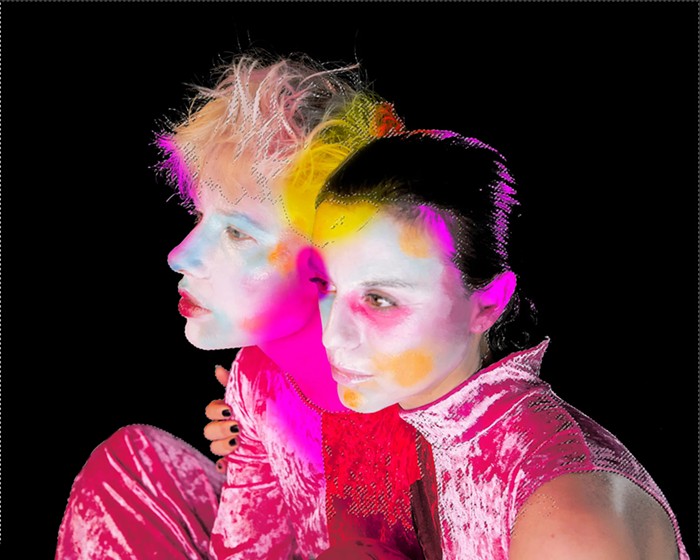In a recent talk at Google headquarters, Paul D. Miller—better known as DJ Spooky—jocularly described his new book, Sound Unbound (MIT Press), as a collection of "36 essays by 36 egomaniacs."
Miller's wit is right on target. For the book, he corralled an impressive roster of opinionated artists and scholars to probe how sampling and other computer-based technology transformed the way music is made and consumed: Jeff E. Winner ruminates on the influence of electronic-music pioneer Raymond Scott; Steve Reich outlines his sometimes turbulent relationship with technology; and in "What One Must Do," Daniel Bernard Roumain's aphoristic musings on composing flicker with brilliance. "By shuffling [on the iPod]... you are participating in a compositional idea... and expanding the very personal nature of one's perception of music." He also repeats Stockhausen's best advice to composers: "If you want to understand music, take a dance class."
Brian Eno, Naeem Mohaiemen ("Fear of a Muslim Planet: Hip-Hop's Hidden History"), Jonathan Lethem, and Pauline Oliveros ("Quantum Improvisation") contribute essays as well; indeed, there's not a single dud in the book. As in his sound work, Miller masterfully synthesizes disparate strains of sound and thought into a new, provocative dialogue.
Iannis Xenakis, a pioneer of digital music, prophetically described music as "that child of number and sound." Insisting on the connection between music, mathematics, and architecture, Xenakis (1922–2001) employed computer calculations to synthesize a new and sometimes terrifyingly complex music. Free of jargon and intimidating reams of equations, Music and Architecture (Pendragon) collects crucial texts, architectural plans, and scores by Xenakis, all in vivid color.
Finally, in Hallelujah Junction (Farrar, Strauss and Giroux), John Adams makes a superb contribution to the tradition of composer-as-writer. Adams, renowned for marrying the pulsating minimalism of Steve Reich and Philip Glass to the expansive, big-boned symphonic sound of Bruckner and Sibelius, recounts his struggle to find his musical voice with surprising honesty. He tallies his failures (which include a homemade synthesizer dubbed "the Studebaker") and chronicles fighting his way to make pathbreaking works such as the monumental Harmonielehre for orchestra and the operas Nixon in China and Doctor Atomic.
Much like the classic Conversations with Igor Stravinsky, Adams weighs in on fellow composers (Ives, Copland, Zappa, Michael Gordon, and others), jousts with critics (especially those who attacked his controversial opera about a terrorist hijacking, The Death of Klinghoffer), and assesses the impact of technology. Unlike Stravinsky, who recoiled at the prospect of electronic music, Adams declares, "Artists should take each new step in the evolution of these machines and turn them into instruments of divine play. It's what we do." Warm and personable, Hallelujah Junction conveys the essence of working, living, struggling, and triumphing as a composer.
Fri 11/28
NUTCRACKER
I've seen Pacific Northwest Ballet's production of the Tchaikovsky ballet many times, and I still love it. Nutcracker tells a tale of gently evaporating youth; in the story, young Clara goes to sleep on Christmas Eve, dreams of fantastic creatures, and meets a handsome prince (who eventually sails away) only to wake up several steps closer to womanhood. Whether you consider Clara's adventure a metaphor for lost love or a brightly hued bourgeois elegy for childhood innocence, Nutcracker pulls the heartstrings (mine, at any rate) with a charming corps of kids and regal pageantry missing from childhood today. The courtly choreography and the sumptuously colored costumes and vivid sets designed by Maurice Sendak undoubtedly help too. I urge you to heed the tradition established when ballet was the province of discreet perverts and louche, minor aristocrats: Bring binoculars or their genteel cousin, opera glasses. Through Tues Dec 30 with a slew of matinees for the kids or still-hungover; see www.pnb.org/season/nutcracker for a complete schedule. McCaw Hall, 321 Mercer St, 441-2424, 7:30 pm, $24–$130.
FUTURE COLLECTIVE
After its inaugural show at the now-shuttered McLeod Residence, this collective resumes its monthly evenings of "experimental jazz, classical, electronic, and improvised music" at Gallery 1412. On the docket: new piano pieces by Jeff Bryant, Keith White, Hanna Benn, and others. Gallery 1412, 1412 18th Ave, 8 pm, free but donations accepted.
MICHAEL OWCHARUK TRIO
Purring bass lines and animated, open-voiced melodies mark this piano-propelled trio. A fresh voice on the scene, Owcharuk slyly transmutes his affection for 20th-century classical music into jazz without resorting to hastily fashioned hybrids. Egan's Ballard Jam House, 1707 NW Market St, 789-1621, 11 pm, $5.
Sat 11/29
THE CHICKERING PIANO QUARTET
Before the ascension of Steinway as the premier piano manufacturer of the 20th century, many other companies, notably Chickering and Broadwood, made instruments of distinct tone, design, and sonic character. Named after one of the better piano-makers of the 19th century (and passable-to-fine specimens in the modern era), this period-instrument quartet proffers chamber music by Liszt, Brahms, and Dohnányí. Also Sun Nov 30 at 3 pm. Queen Anne Christian Church, 1316 Third Ave W, 726-6088, 8 pm, $10–$25.
Sun 11/30
SACRED SOUNDS OF CHRISTMAS
Is it too soon to sing Christmas songs in November? Seattle Pacific University herds a panoply of their resident ensembles—the Concert Choir, Wind Symphony, String Orchestra, Women's Choir, and Men's Choir—to traipse through a mix of seasonal hymns and mandatory tunes such as "Silent Night." If November seems a tad early, wait a couple days for the University of Washington's CarolFest, listed below. Benaroya Hall, 200 University St, 292-2787, 4 and 7 pm, $17/$20.
Mon 12/1
SEATTLE WOMEN'S JAZZ ORCHESTRA
One of our burg's best big bands, this outfit plays a toe-tapping mix of classics, overlooked tunes, and originals that embrace Basie-esque swing, bop, and Latin jazz. With guest singer Greta Matassa. Jazz Alley, 2033 Sixth Ave, 441-9729, 7:30 pm, $20.
Tues 12/2
CAROLFEST
Almost every UW ensemble—even the Men's Glee Club—teams up for the usual bout of holiday songs and chorales. For the finale, all 500-odd performers pack the stage for the tongue-in-cheek "A Musicological Journey Through the 12 Days of Christmas." Meany Theater, UW Campus, 543-4880, 7:30 pm, $10.


















